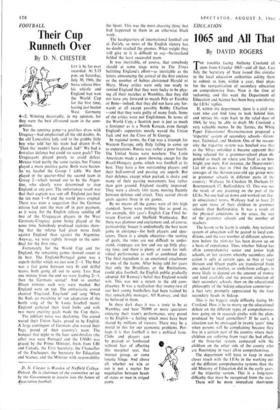Their Cup Runneth Over
FOOT BALL
By D. N. CHESTER
LET it be for ever recorded. At 5.15
p.m. on Saturday, July 30, 1966, the
s Swiss referee blew
England had won the World Cup having just beaten West Germany 4-2. Winning deservedly, in my opinion, for they were the best all-round team in the com- petition.
Yet the opening game--a goal-less draw with
Uruguay—had emphasised all the old doubts. As the old Lancashire lady said to the grubby little boy who told her his team had drawn 0-0, 'Then tha' needn't have played, lad!' We had a first-class defence but could we score goals? The Uruguayans played purely to avoid defeat. Mexico tried partly the same tactics, but France played a more positive game. Both were beaten. So we headed the Group I table. We then played in the quarter-final the second team in Group 2—which turned out to be the Argen- tine, who clearly were determined to stop England at any cost. The unfortunate result was that their captain was sent off. England just beat the ten men 1--0 and the world press erupted. There was even a suggestion that the German referee had sent the man off in part payment. as it were, for the English referee sending off two of the Uruguayan players in the West Germany-Uruguay game being played at the same time. Somebody produced statistics show- ing that the referee had given more fouls against England than against the Argentine. Anyway, we were rightly through to the semi- final for the first time.
Fortunately for the World Cup and for England, the remaining games showed soccer at its best. The England-Portugal game was a superb thriller which we just won 2-1. The final was a fast game between very fit and skilful teams, both going all out to score. Less than one minute from the end we were leading 2-1, then the Germans scored! And so another fifteen minutes each way were needed. But England were on top. The enthusiastic crowd chanted 'Eng-land. Eng-land' and sang 'When the Reds go marching in' (an adaptation of the battle song of the St Louis baseball team). England gathered their tired limbs and with two more exciting goals made the Cup theirs.
The jubilant noise was deafening. The crowd waved their Union Jacks, proud to be English. A large contingent of Germans also waved their flags, proud of their country's team. The banquet that night to the four semi-finalists (the other two were Portugal and the USSR) was graced by the Prime Minister, fresh from LBJ and Canada, the First Secretary, the Chancellor of the Exchequer, the Secretary for Education and Science, and the.Minister with responsibility D. N. Chester is Warden of Nuffield College. Oxford. He is chairman of the committee set up by the Government to inquire into the future of Association football. for Sport. This was the most cheering thing that had happened to them in an otherwise black week.
The headquarters of international football are at Zurich, so news of the English victory has no doubt reached the gnomes. What weight they will give to it is difficult to say—Switzerland fielded the least successful team.
It was inevitable, of course, that somebody should at some stage write to The Times belittling England's effort—as inevitable as the letters announcing the arrival of the first cuckoo or the number of babies christened Harold or Mary. Many critics were only too ready to remind England that they were lucky to be play- ing all their matches at Wembley, that they did not have any forward to match Pele or Eusebio or Bene—indeed, that they did not have any for- wards at all except possibly Bobby Charlton —and that they were guilty of many fouls. Some of the critics were not Englishmen. In terms of the World Cup, a Scottish peer is just as much a foreigner as is a North Korean, even though England's supporters mostly waved the Union Jack and not the Cross of St George.
In regional terms, the Cup was a triumph for Western Europe, only Italy failing to come up to expectations. Russia was rather a poor fourth. The United States were nowhere. The Latin Americans made a poor showing, except for the Brazil-Hungary game, which was football at its best. They have a few outstanding players and their ball-control and passing are superb. But their defence, except when packed, is shaky and many of their paSsing movements lose rather than gain ground. England steadily improved. They were a closely knit team, moving fluently between defence and attack. They scored eleven goals against three in six games.
By no means all the games were of this high standard. Some were nothing like as good as, for example, this year's English Cup Final be- tween Everton and Sheffield Wednesday. But there was glamour and excitement and, of course, partisanship. Soccer is undoubtedly the best team game in existence—for both players and spec- tators. There is a simple objective—the scoring of goals, the rules are not difficult to under- stand, stoppages are few and use up little play- ing time, and there is plenty of room for indi- vidual performance as well as combined play. The final ingredient is an emotional attachment to one of the teams. After being told for years that only the Brazilians, or the Ruritanians, could play football, the English public gradually adopted Alf Ramsey's belief that England would win. This was not a return to the old com- placency. It was a realisation that twenty-two of our best young footballers had been trained by that remarkable manager, Alf Ramsey, and that he believed in them.
In these dark days it was a tonic to be at Wembley and hear 70,000 or more spectators enjoying their team's performance, very proud





























 Previous page
Previous page